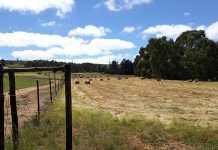
According to the National Development Plan (NDP), agriculture is expected to create a million jobs by 2030. This is in stark contrast to the ‘real world’, where agriculture shed 112 000 jobs between 1994 and 2004. This trend has continued and 73 000 jobs have been lost since the second quarter of 2013. According to DA agricultural spokesperson Annette Steyn, this is equal to 10% job losses within one year.
READ:We can feed Southern Africa
Job creation in agriculture can only take place if production increases. Farmers cannot employ more people at higher wages and produce the same or less than they did with fewer workers. Import replacement and increased exports have been cited as ways of increasing agricultural and agribusiness employment. To do this, South African agriculture must be able to compete with producers in other countries.
While our commercial farmers are probably as good as or better than producers in most other countries, domestic support measures and export subsidies in those countries enable them to export products at lower prices than South Africa. But government is careful not to increase import tariffs or institute trade remedies unless rigorous proof from industry shows material damage from the specific imports.
And so we import more than half our total wheat consumption, while we have the capacity to produce enough for our own use.
There are many other examples where well-applied import protection measures can result in higher local agricultural production.
This will need both political will and a long-term approach from government.
Improving efficiency
South Africa’s agriculture must be able to produce products at prices that compete internationally. If not, products are imported and we cannot compete internationally. It is thus imperative for farmers to continually improve the efficiency of their businesses. One way is to use modern technology and reduce labour requirements. The strikes (by non-farm workers) in the fruit-producing areas last year also saw many farmers speeding up the rate of mechanisation.
You have only to drive through a wine-producing area at harvest time to see the number of grape harvesting machines in operation. But even if we put aside higher wages, the red tape involved in terminating a worker’s contract and the ever-present risk of unrest, it is clear that agriculture is not normally a job-creating industry. Mechanisation is simply more efficient and, in some cases, cheaper.
The NDP also places much emphasis on creating jobs through increasing the area under irrigation. While this may be true for some labour- intensive industries such as certain vegetables, it is not true in the case of grain production, where it is possible to manage huge areas with very few labourers.
Security of tenure
Commercial farmers do have the capacity to expand their businesses. Whether they will do so in cases where there are two or more opposing land claims on their land is doubtful. Security of land tenure is a prerequisite for farmers who want to increase the size of their farming enterprises. Until the current land claims procedure is completed, this will remain a stumbling block to increased production and hence increased employment.
The real potential for job creation lies outside the farmgate. Agribusinesses are the real beneficiaries when agricultural production increases. Job creation in upstream and downstream industries will quite possibly exceed job creation in primary agriculture.
Subsistence farmers
Small-scale and subsistence farmers will not create jobs. While actions to improve their productivity will improve their household food security and provide some income, there will be no job creation. The idea of establishing additional people as small-scale farmers will only add to the rural poor.
From an economic perspective, it seems unlikely that agriculture can provide the million extra jobs expected in the NDP. Agriculture should explain the economic realities that limit job creation in the sector to government and to the politicians. This does not mean that we do not need a growing and developing agriculture sector. Without a growing sector, household food security is doomed.
Farmers and government have to join hands to ensure agricultural growth without fixating on impossible targets.
Dr Koos Coetzee is an agricultural economist at the MPO.



